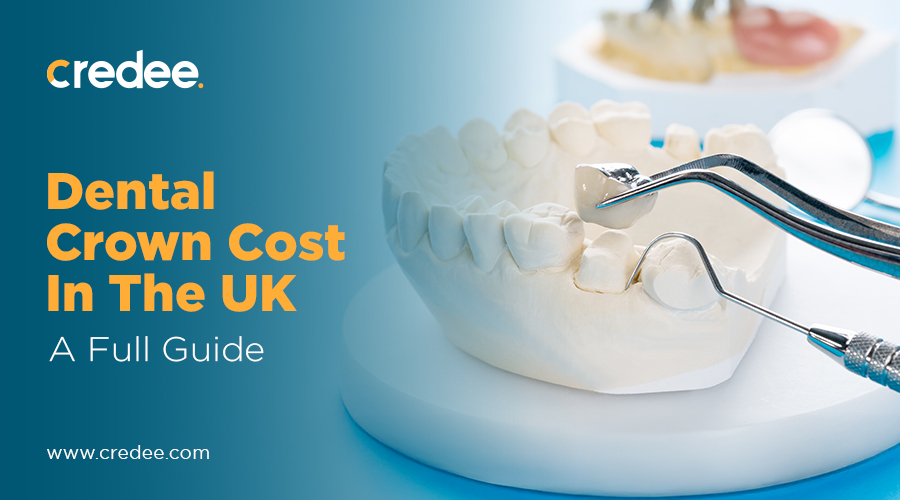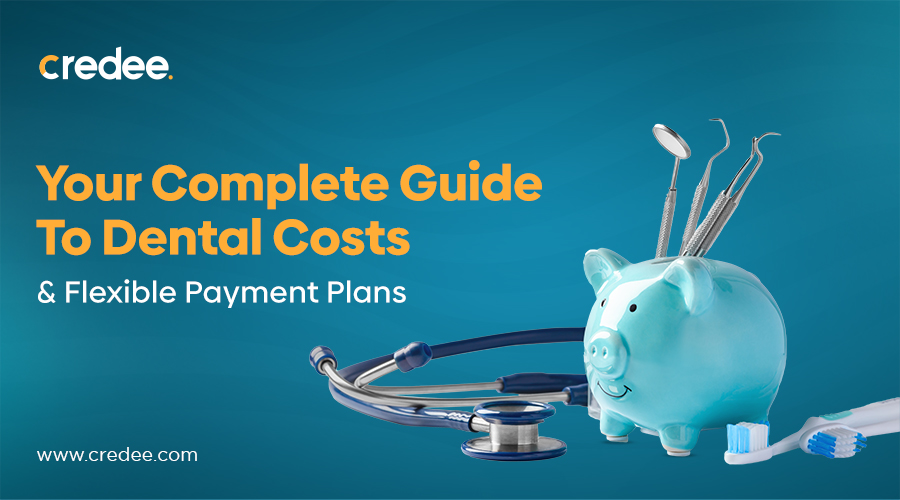
Many people struggle with decayed, broken, or worn-out teeth, which affect both their smile and oral health. The good news? Dental crowns offer a strong, long-lasting solution to restore a tooth’s function and appearance—often preventing the need for an extraction.
However, one of the biggest concerns before choosing any treatment is its cost. If you're wondering, "How much does a dental crown cost in the UK?" or “What is the tooth cap cost?”—you're not alone! But we have the answer. The price typically ranges from £200 to £1,200, depending on the material of the crown.
Nearly ⅓ of the population in the UK is suffering from untreated tooth decay. This is higher in men (31.5%) than women (23.6%) and most prevalent in those aged 25-34 (35.3%).
Source: FollowApp.Care
Before diving into the numbers, let’s first explore why a dental crown might be the perfect solution for you!
What Is a Dental Crown and How Does It Work?
A dental crown is like a protective cap for a damaged tooth. It covers the entire tooth, restoring its shape, size, strength, and appearance. Crowns are often needed when a tooth is weak, broken, or has a large filling that needs support.
For instance, your tooth gets cracked after biting something hard. If left untreated, the crack can get worse, causing pain or even tooth loss. So, a dentist places a crown over the tooth, protecting it and making it look and function like a natural tooth again.
Various Types of Dental Crowns
There are different types of dental crowns, each catering to specific needs in terms of durability, appearance, and function. Additionally, the dental crown cost UK varies depending on the type selected.
1. Porcelain Crowns (All-Ceramic)
These are the most natural-looking options, making them ideal for front teeth. They are made entirely of ceramic or porcelain, closely resembling real teeth. Additionally, they are a great choice for people with metal allergies. However, they may not be as strong as other types.
2. Porcelain-Fused-to-Metal (PFM) Crowns
The metal base in this crown provides durability, while the outer porcelain layer ensures a natural appearance. That said, these crowns are commonly used for both front and back teeth but may wear down opposing teeth over time.
3. Metal Crowns
Made from gold or other alloys, these crowns are extremely strong and long-lasting. They resist chipping and breaking, therefore, making them an excellent choice for molars that endure heavy chewing. However, their metallic color makes them less desirable for visible teeth.
4. Zirconia Crowns
It offers both strength and a natural look. They are more durable compared to porcelain crowns and are less likely to chip. Thus making them suitable for both front and back teeth. They are also a great option for people who grind their teeth.
5. Temporary Crowns
Want a short-term solution while waiting for a permanent crown? This crown is perfect for you. Made of acrylic or stainless steel, they protect the tooth but are not as strong as permanent options. Dentists often use them after procedures like root canals until the final crown is ready.
Discover the best ways to afford dental implants in 2025!
How Much Does a Dental Crown Cost in the UK?
The table below outlines the tooth crown cost in the UK, as well as their pros and cons. This information will help you understand your options and select the right crown for you.
| Crown | Cost | Advantage | Disadvantage |
|---|---|---|---|
| Porcelain Crowns | £400-£1,200 | -Best for front teeth due to their natural look. -Biocompatible (no metal, so fewer allergic reactions). | -Less durable than metal crowns. -Can chip or crack under heavy pressure. |
| Porcelain-Fused-to-Metal (PFM) Crowns | £800-£1,200 | -Stronger than all-porcelain crowns. -Suitable for both front and back teeth. | -The porcelain layer may wear down over time. -Can cause a grayish tint near the gumline. |
| Metal Crowns (Gold, Silver, or Alloys) | £250-£600 | -Highly durable, lasting many years. -Require less tooth removal during placement. | -Metallic color is not aesthetically pleasing. -More expensive due to material cost. |
| Zirconia Crowns | £800-£1,100 | -Extremely strong and long-lasting. -Looks natural and blends well with other teeth. | -Can be expensive. -May cause wear on opposing teeth due to hardness. |
| Resin Crowns | £200-£500 | -Less expensive than other types. -Quick to produce. | -Less durable and prone to wear or fractures. -Stains more easily over time. |
Options for Covering the Dental Crown Cost in the UK
Paying for a dental crown in the UK can be done in several ways:
1. NHS or Private Treatment
Eligible patients can get NHS dental crowns for about £319 under Band 3 treatment. Moreover, if you need additional treatment within two months at the same or a lower charge band, there will be no extra cost.
2. Dental Insurance
Some dental insurance plans cover part of the cost of a crown, depending on your policy. Check with your provider to see what’s included.
3. Personal Savings or Credit Cards
If other options aren’t available, you can use savings or a credit card to pay for the procedure.
After consulting your dentist, you can take advantage of these options. But if you don’t qualify, there’s another solution for you.
Credee Payment Plans for the UK
For many, the tooth cap cost in the UK can be overwhelming. But with Credee’s payment plans UK, there’s no need to worry. Credee provides flexible payment options with no credit checks and an approval rate of 97%. Many dentists in the states of the UK are already offering these plans to their patients, so don’t forget to ask your provider about it. This can make the tooth crown cost in the UK more affordable and stress-free.
What’s more:
- No hassle with paperwork or extended wait times.
- Get approved even with a low credit score.
- Enjoy transparent terms, with no unexpected charges.
- Apply and manage payments seamlessly from any device.
The Complete Process of Getting a Dental Crown
Now that you have understood the dental crown cost in the UK and are thinking about which crown will be perfect for you, let’s dive into the procedure. The procedure for getting a dental crown typically involves a few visits to the dentist. Here’s a simple breakdown of the process:
1. First Visit – Checking the Tooth
To begin with, the dentist will examine your tooth and take X-rays to assess the damage. In some cases, a root canal may be needed before placing the crown.
2. Preparing the Tooth
Next, the dentist will shape the tooth by removing any damaged parts. If the tooth is too small or weak, they might add filling material to make it strong enough to hold the crown.
3. Taking Impressions
Once this is done, the dentist will take an impression (mold) of your teeth to create a custom crown that fits perfectly. Alternatively, some dentists use a digital scanner instead of a mold.
4. Temporary Crown
Since making the permanent crown takes a few weeks, the dentist will put a temporary crown on your tooth to protect it.
5. Placing the Permanent Crown
Once the final crown is ready, you’ll visit the dentist again. They will check if it fits well and looks natural before fixing it in place with strong dental cement.
6. Final Adjustments
In the last step, the dentist will make small adjustments to ensure your bite feels comfortable. Once everything is perfect, you’re all set with your new crown.
Dental Crown Recovery: What to Expect and How Long It Takes
The recovery time for a dental crown is generally quick and easy, with most people experiencing minimal discomfort. Here’s what to expect:
1. First Few Hours: After the procedure, you may experience mild soreness or sensitivity around the treated area. Moreover, if you have any local anesthesia, the numbness will wear off within a couple of hours.
2. First Few Days: In the meantime, for the first 2-3 days, you might feel some discomfort when biting or chewing. Especially if the crown feels too high or is not perfectly aligned. You might also experience sensitivity to hot or cold, which should improve as your gums heal.
3. Full Recovery (1-2 Weeks): Most people feel fully recovered within 1 to 2 weeks. During this time, the gums around the crown may still be tender, but this should resolve quickly. Any sensitivity should also subside within this period.
Ensure the Longevity of Your Dental Crown
Following are some essential aftercare tips for a smooth recovery:
- Avoid hard or sticky foods.
- Brush and floss gently around the crown.
- Stay away from extremely hot or cold foods and drinks.
- Use over-the-counter pain relievers if necessary.
- Attend follow-up appointments with your dentist.
- Protect the crown if you grind your teeth, thus use a mouthguard.
- Monitor for any persistent discomfort or issues.
Wrap Up!
Dental crowns are an excellent choice if you have chipped or damaged teeth. With proper care, they can provide long-lasting protection while enhancing the appearance and function of your smile. On average, the dental crown cost in the UK is around £700, though the price can vary based on factors like location, crown type, dentist expertise, and additional charges.
However, for many, the tooth cap cost in the UK can be overwhelming. But with Credee’s payment plans, there’s no need to worry. Credee provides flexible payment options with no credit checks and an approval rate of 97%. Many dentists in the states of the UK are already offering these plans to their patients, so don’t forget to ask your provider about it. This can make the tooth crown cost in the UK more affordable and stress-free.
Frequently Asked Questions (FAQs)
A. What Is the Front Tooth Crown Cost in the UK?
The cost of a front tooth crown in the UK typically ranges from £500 to £1,200, depending on factors like the material used (e.g., porcelain or ceramic), the dentist's location, and their expertise.
B. How Much Does White Crown Tooth Cost in the UK?
The cost of a white crown tooth in the UK typically ranges from £500 to £1,200. White crowns are often made of porcelain or ceramic.
C. How Much Do Dental Crowns Last?
Dental crowns typically last between 10 to 15 years, depending on the material used and how well they are cared for.
D. What Is the Most Aesthetically Pleasing Dental Crown?
The most aesthetically pleasing dental crown is usually made of porcelain or ceramic, as they closely resemble the natural color and translucency of teeth. These crowns are ideal for visible teeth, offering a natural, seamless look while providing durability and strength.
Many UK dentists offer Credee's flexible payment plans—don't miss out!
Check Eligibility



